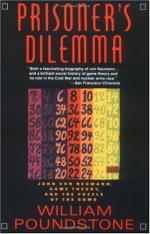
|
| Name: _________________________ | Period: ___________________ |
This test consists of 5 short answer questions, 10 short essay questions, and 1 (of 3) essay topics.
Short Answer Questions
1. In the divide the cake game the chooser seeks to minimize the ___ piece of cake the cutter will receive.
2. Russell was the first to suggest a different game model for ___ than prisoner's dilemma.
3. Who conducted an experiment to see how real people would respond in the prisoner's dilemma game model?
4. Who originally suggested the RAND Corporation as a research and development institute?
5. In the 1950s and 1960s many viewed international conflict, and specifically ____ as a kind of prisoner's dilemma.
Short Essay Questions
1. Why did Bertrand Russell suggest and believe in the merits of preemptive nuclear war?
2. Why do Poker and Baseball involve mixed strategies?
3. Who originally suggested the RAND corporation and for what purpose?
4. What is the IAS?
5. What is Kriegspiel?
6. Why was von Neumann considered the "best brain in the world?"
7. What was the Princeton social scene like while von Neumann was at IAS?
8. How does von Neumann's game theory relate to economics?
9. What were the results of Flood's experimental prisoner's dilemmas?
10. Where is von Neumann from and why was he considered a child prodigy?
Essay Topics
Write an essay for ONE of the following topics:
Essay Topic 1
In Chapter 4, the place of game theory in wartime is detailed by the author. What role did game theory play in wartime in the United States? In Europe? In Japan? In Cuba?
Essay Topic 2
Why did interest in game theory wane in the mid-1950s? With whom or with what did the public associate game theory by this time? How did this discontent affect the focus of game theory research? How did the Ohio Studies come out of this shift? What did the Ohio State studies examine and what did they reveal, including in later variations in the studies?
Essay Topic 3
Chapter 11 details more social dilemmas and outlines differences in two classes of games - symmetric and asymmetric. What is the difference between symmetric and asymmetric games? What are examples of both? How do you play a game of Bully and how is this game a model for human conflict?
|
This section contains 808 words (approx. 3 pages at 300 words per page) |

|




